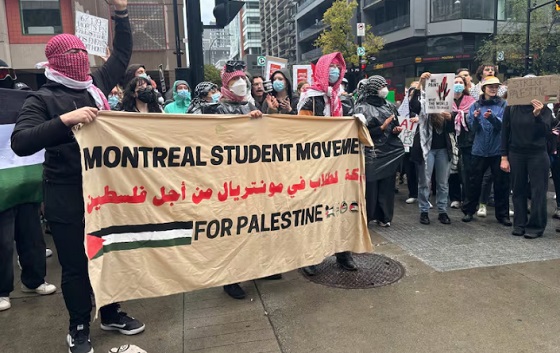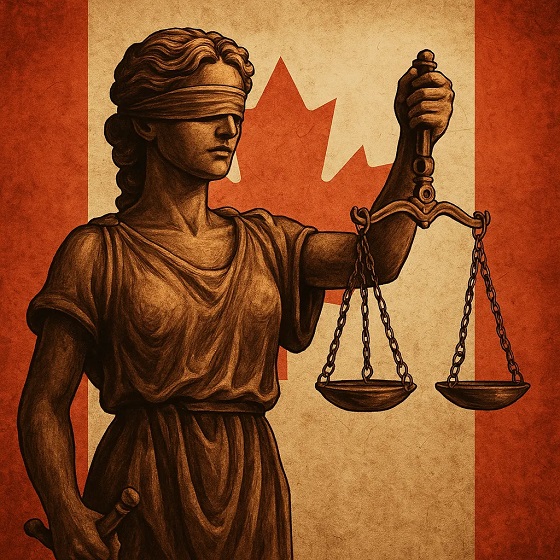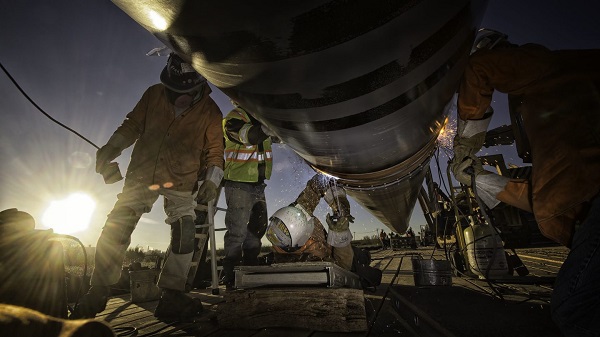Haultain Research
Inclusion and Disorder: Unlearned Lessons from Palestinian Protests

Haultain’s Research is a reader-supported publication.
To receive new posts and support our work, please consider becoming a free or paid subscriber.
Try it out.
Tuesday (October 7 , 2025), two years after the Hamas massacre of Israeli civilians, mobs gathered across Canadian cities to honour their “martyrs.” At Concordia University in Montreal, administrators closed the downtown campus after two agitators, neither students nor staff, were arrested carrying incendiary devices. The university president wrote to the community expressing “sadness” for the disruption, affirming that Concordia “values inclusion, compassion, and the right to peaceful expression.” She explained that the closure was taken to “ensure the safety of all members of our community” amid the “heightened tension” surrounding the day. The tone was heavy with empathy and the vocabulary of inclusion, yet the act itself was exclusion by necessity. An institution that proudly celebrates tolerance and has repeatedly looked the other way when violence visited it, could no longer tolerate its own openness.
This was no isolated disturbance. It exposed a country that has lost the ability to distinguish between rights and indulgences. Every person in Canada, citizen or not, enjoys freedom of expression under the Charter. But the right to speak is not the same as the right to intimidate free citizens or to steer the ship of state. Political influence, whether through organized protest or lobbying, is the privilege of citizenship. That distinction once defined the sovereignty of the Canadian electorate. Canadians blur it and obscure human decency at their peril.
Haultain Research is a reader-supported publication.
To receive new posts and support our work, consider becoming a free or paid subscriber.
When non-citizens, including refugees and temporary residents, take to the streets to influence policy or intimidate authority, they step beyond expression into the political arena. Such demonstrations are not exercises in speech but acts of pressure. When they honour the maniacal murdering militancy of a terrorist organization or directly menace Canadian citizens, they move from persuasion to coercion. To allow that is to confuse liberty with licence.
Defending the boundary between speech and influence is not xenophobia. It is democratic hygiene. The right to shape the national direction belongs to those who share in its civic burdens and shoulder the responsibility to maintain order. Citizenship is a contract of mutual responsibility, not a costume of convenience.
The larger question is whether a liberal democracy can endure if it loses the will to defend itself from those who despise it or openly call for its demise. Canada’s cult of inclusion has become a moral weakness. As I wrote in Inclusion as Exclusion, revolutionaries begin by invoking “the people” and end by deciding who among the people must be silenced. The illusion of harmony soon gives way to the machinery of coercion. Once inclusion loses its grounding in reason and character, it collapses into sentimental tyranny.
Canada’s political class long ago traded prudence for performance. It mistakes sympathy for justice and emotion for policy. Justin Trudeau’s politics of feeling rested on the belief that those he pitied are too delicate to survive disagreement (For the rest, there is the Emergencies Act). This insecurity explains his fascination with inclusion campaigns and his instinct to brand dissenters as extremists. It also explains why, when he told Donald Trump that a tariff might destroy Canada’s economy, Trump concluded that any country undone by a tariff was not a serious country, let alone a country worthy of partnering with to defend hemispheric security.
Carney’s response has been to hide behind Europeans. A country unwilling to stand for itself isn’t a real country.
The same weakness shapes our handling of protest movements. When radical Islamists celebrate blood-lusting massacre, Canada’s leaders speak of understanding. When women object to being erased by gender politics, they speak of diversity. When immigration overwhelms cities, they call it growth. Compassion has become the disguise of decay.
Sweden provides a mirror. For decades it was the symbol of multicultural virtue, convinced that tolerance alone could reconcile every difference. Then came crime, social division, and collapsing trust. Sweden finally admitted the obvious: generosity without limits destroys cohesion. The country began to rebuild.
Sweden tightened its asylum rules, limited access to certain welfare benefits, and moved to make citizenship a clearer boundary for political rights and privileges that residency alone does not confer. Foreign nationals may speak, worship, and assemble, but they may not direct the country’s political course. Sweden continues to protect the right to protest under constitutional guarantees, though demonstrations may be restricted if they amount to incitement, threats to public order, or agitation against protected groups. These measures are not cruelty but recovery. They remind Swedes that harmony depends on shared norms and that tolerance must have boundaries.
Canada refuses the lesson. It continues to pursue immigration at a scale that strains housing, infrastructure, and wages. The policy is an attempt at a moral display, not governance. Citizens who question it are called intolerant. The insult replaces argument and conceals failure.
In this climate inclusion no longer means participation. It means obedience. It demands surrender to ideology rather than respect for difference. At Concordia, administrators claimed to protect community by closing classrooms. In Ottawa, the government preaches equality while enforcing privilege by category. The result is exclusion parading as virtue.
The rule of law, a crowning achievement of Western civilization, rests on restraint. Rights are reciprocal, not infinite. When inclusion is detached from responsibility, that reciprocity dissolves. What begins as compassion ends as coercion. Sweden learned through hardship that multiculturalism without integration breeds division. Canada insists on not learning it the expensive way.
The remedy is simple, though not easy. We must restore the distinction between citizen and non-citizen, between expression and manipulation, between inclusion and indulgence. A country exists to defend the liberty of its people, not to exhibit the moral vanity of its ruling classes. That would require courage, a quality seldom visible in present leadership.
The defense of liberty is not an act of hostility. It is an act of self-respect. A confident country knows who belongs, what it stands for, and what it will not tolerate. Does Canada? Sweden, sobered by experience, has remembered this truth. Canada, lost in woke sentimental fog, must rediscover it or continue drifting toward the soft despotism of its own good intentions.
To help us bring you more quality research and commentary, please Subscribe to Haultain Research
Censorship Industrial Complex
Bill C-9 and the Tyranny of Feeling Heading Straight for Canadians

When governments turn offence into law, liberty collapses into sentiment. Canada risks importing Britain’s mistakes, just as J.D. Vance warned Europe in Munich.
On February 14th of this year (coincidentally, the anniversary of Justin Trudeau’s invocation of the Emergencies Act against protestors), in the grand hall of the Munich Security Conference, J.D. Vance startled Europe’s elites by saying what few of them expected to hear. The greatest threat to their democracy, he argued, was not Moscow. It was their own governments that turned on their citizens in the name of fighting misinformation and hate. Vance catalogued the evidence with blunt precision: British citizens arrested for jokes on Twitter, preachers detained for quoting scripture, elections tampered with under the smiling banner of progress. The room bristled with discomfort, yet the truth could not be mistaken. Western democracies are abandoning the free expression that once sustained them, and they are doing so under the new morality of emotion.
Canada now finds itself in that same trajectory with Bill C-9, Ottawa’s latest legislative foray into the culture war. It is being sold as the Combatting Hate Act, a law meant to protect vulnerable minorities and to defend sacred spaces from intimidation.
Peel back the packaging and its essence appears at once: the codification of subjective feelings into the Criminal Code. What the United Kingdom has lived through for the last decade, police investigating citizens for limericks and memes, Canada now risks importing as law.
The mechanics of the bill are deceptively technical. Until now, prosecutions for so-called hate propaganda required the Attorney General’s approval. That safeguard was in place to ensure that prosecutions were filtered through political accountability and not simply triggered by an activist’s complaint. Bill C-9 abolishes that filter, placing the discretion squarely with police officers who will be pressed to act on every allegation. Remember how the cops acted during COVID.
The bill then goes further by creating new offences for the “willful promotion of hatred” through words, symbols, or representations, a category so broad it could ensnare a placard at a school board protest or a verse from scripture. It also introduces a stand-alone “hate crime” category in which the motive itself becomes the crime. In short, it criminalizes thought. Finally, it expands criminal liability to anyone who obstructs or intimidates access to religious or cultural sites. In the last five years, the law in Canada has not been exceptionally diligent in prosecuting church arson and gunfire attacks on synagogues, despite existing laws. The C-9 wording is so loose that a prayer vigil outside an abortion clinic or a parents’ protest at a school could easily fall within its net.
Why does this matter? Because it moves the law away from objective acts of violence or harassment and into the murky realm of motive. It is one thing to punish a man for assault; it is quite another to punish him more severely because a cop or judge claims to know the intention behind his act. It is one thing to outlaw threats; it is quite another to treat blunt disagreement as hate. The result is predictable. Citizens will censor themselves on questions of immigration, gender ideology, or religious teaching because the cost of speaking plainly will be too high. The process itself, arrest, seizure of devices, and the humiliating headline will become the punishment.
The British experience shows us the road ahead. Harry Miller, a former policeman, was investigated in 2019 for retweeting a limerick that mocked gender identity theory. Police recorded a “non-crime hate incident” in his file and told him they needed to “check his thinking.” Paul Chambers, in 2010, made a sarcastic joke on Twitter about blowing up an airport after his flight was cancelled. He was arrested, fined, and lost his job, but was acquitted only years later, by which time the damage had already been done.
Haultain Research is a reader-supported publication.
To receive new posts and support our work, consider becoming a free or paid subscriber.
In 2020, Kate Scottow was detained and held for questioning because she “misgendered” someone online; her children were left alone as police seized her devices. British street preachers have been hauled away for reading biblical verses aloud. Even football fans have been arrested for chants and tweets. In a single year, British police recorded 120,000 “non-crime hate incidents” and arrested roughly 3,000 people for “grossly offensive” posts.
The phrase in Britain is “grossly offensive.” The phrase in Canada will be “wilfully promoting hatred.” Both are so elastic that they depend solely on the complainant’s feelings. In effect, the state outsources its standards to the most sensitive or malevolent among us, empowering activists to wield the criminal law as a bludgeon against their opponents.
Here, J.D. Vance’s speech in Munich is especially relevant. He noted that Western elites have become adept at justifying repression under the guise of safety. They claim to fight disinformation, but in practice, they suppress opposition. They claim to defend minorities, but in practice, they silence majorities. They claim to defend democracy, yet in Europe, they annul elections. In Canada, there is now a push to criminalize dissent.
What emerges is a selective enforcement regime in which elites are exempt and ordinary citizens are vulnerable. A tweet from a farmer in Red Deer will be treated as criminal, while a prime minister declaring that parents who question gender ideology are extremists goes unpunished.
Beneath all of this lies a deeper cultural drift. Bill C-9 is not merely bad law. It is bad philosophy. Modern governments have learned to glorify emotivism, to elevate feelings over objective reason because emotions win elections. The Canadian philosopher Charles Taylor clearly saw this trend in his Massey lectures, later published as The Malaise of Modernity. Allan Bloom did the same in his Closing of the American Mind.
Taylor warned that when cultures replace shared standards of truth with the subjectivity of self-expression, they hollow out the ground beneath their toes. Bill C-9 is the juridical form of that malaise, the victory of the subjective over the rational, the enthronement of offence as a legal standard. When reason is abandoned, politics slides into tyranny, for then only force remains to adjudicate among clashing feelings.
The antidote against those who want to curtail your speech is not silence but more speech. Resistance begins with refusing to be cowed. State the obvious, again and again: men are not women, women are not men, for example. The categories of nature are not dissolved by individual whim.
Hannah Arendt, who more than anyone decoded the mechanisms of totalitarianism in the twentieth century, insisted that the greatest threat to power was not always open rebellion but ridicule. Mock the absurdities of their ideology, not in cruelty but in charity. Expose them as unserious, as unscientific, as laughable. Power that relies on emotion and feeling cannot withstand laughter. The rule of sentiment is brittle, which is why it demands coercion to sustain itself.
John Stuart Mill remains the strongest guide here. In On Liberty, he reminded us that the suppression of any opinion, however offensive, robs society of the chance to test truth. If an opinion is wrong, it sharpens truth by contest; if it is right, then silencing it robs us of truth itself. Mill’s harm principle is stark in its relevance. The state may act only to prevent real harm, not to shield citizens from chafed feelings. Hurt feelings are the price of liberty, and liberty is the most valuable condition for reason to flourish. When governments claim the right to protect citizens from offence, they do not protect minorities; they infantilize everyone.
So who loses under Bill C-9? Faith communities, whose doctrine can be branded hateful. Parents who risk charges for questioning curricula. Feminists who fight to preserve sex-based protections. Protesters, from truckers to farmers to pro-life advocates. And ordinary Canadians online, whose memes and jokes can be turned into evidence of “hate propaganda.”
Bill C-9 is not a shield for the vulnerable. It is a sword for the boundlessly powerful. It is the law’s surrender to the tyranny of feeling, the enthronement of emotion as authority. Vance’s warning in Munich was not only for Europe. It was for Canadians too. If disagreement is hate, liberty itself is outlawed. Canada now faces a choice: do we defend and protect our freedom, or do we accept a government that punishes thought?
The antidote remains the same: resist, speak, mock, and laugh. Proclaim the truth plainly but respectfully. Refuse to bow to the cult of feeling. The rule of reason is fragile but essential. It must be preserved. Without it, Canada will follow Britain into the swamp of self-censorship and state-enforced sentiment. With it, liberty might yet endure.
I wrote this post based on a few notes that I made for this conversation in Leaders on the Frontier.
Please subscribe to Haultain Research.
For the full experience, and to help us bring you more quality research and commentary, please upgrade your subscription.
Alberta
No Permission Required: Alberta Will Protect Its Daughters

Section 33 Is a Legitimate Democratic Instrument
Tell everyone. There is no Charter right for a biological male to compete against females in women’s sports. Nor is there a constitutional right for children to be maimed and rendered sterile in service to self-proclaimed identities. And there is certainly no excuse for a government in Ottawa to interfere with provinces’ ability to defend women and girls from the fallout of sexual fetishism dressed in federalist drags.
Yet here we are.
Albertans are being invited to ask an important question. When rights collide, should we trust the flawed judgment of elected officials who face the people every few years, or surrender that authority to similarly flawed judges selected in near secrecy, immune to removal, and uninterested in the lived realities of the citizens they affect?
Section 33 of the Charter—the “notwithstanding clause”—exists for precisely this purpose. It was never a loophole. It was a constitutional safeguard demanded by Premiers like Alberta’s Peter Lougheed and Saskatchewan’s Allan Blakeney. It was their condition for agreeing to the Trudeau Charter in 1982, a shield for legislatures to retain sovereignty in cases where Ottawa-appointed, unelected courts would push too far into political life. It was a tool to defend provincial uniqueness against Ottawa’s homogenizing power.
Blakeney explained it plainly. Where judicial rulings lead to outcomes that might cause undue harm, for example, legislatures must retain the right to legislate, even if a court believes a Charter right has been breached. It was an elegant way to deal with the inevitable tension between rights adjudicated by judges and those protected by governments chosen by the people. It was a way to guarantee democracy over legal technocracy. The hysterical NDP machine will have people believe it is also the legislation of cruelty.

Section 33 is a temporary mechanism—suitable for five years, renewable only through re-legislation. Whatever the progressives say, it does not override or erase any rights. It cannot be used in secret, and any government that invokes it must defend its choice publicly. That is democratic accountability. The people can debate it (and we now where the contemporary left stands on debating), throw the government out, or demand that the law be changed, if they so choose.
This safeguard is now essential. Alberta is acting to protect the integrity of women’s sports and spaces. Who would be against protecting their daughters? Girls have lost competitions, lost scholarships, and in some cases been physically injured competing against males who claim to be female. These are not hypotheticals. They are real, measurable harms—harms progressive politicians and the courts are at times unwilling to recognize. Alberta’s proposed protections have drawn fierce opposition from progressive ideological activists and their allies in the press and the federal parliament, who now claim that such laws are contrary to the Charter. They seek to keep imposing without open debate the fiction that there is a Charter right for a biological male to compete against females in women’s sports.
There is no such right, and it doesn’t exist in the Charter. The Charter was not drafted to validate identity fantasies. It was not written to erase biological sex or enshrine the right of middle-aged men to force immigrant women to handle their genitals. It was not intended to give minors access to irreversible surgeries without the knowledge or consent of their parents. These things are being “read into” the Charter by tribunals and activist judges trained in Laurentian law schools with no democratic mandate, often under pressure from a woke federal government happy to let the courts advance policies it wants but is afraid to pass through Parliament.
Naheed Nenshi has made it clear where he stands. He bluntly opposes the use of Section 33 to protect Alberta women and girls. His allegiance is to the same cultural current that waddles through Ottawa. He speaks the language of progress but misses the point entirely. This isn’t about political posturing. It is about protecting girls and women from being injured, marginalized, and erased to satisfy the ideological demands of his political base.
It is about affirming the constitutional prerogative of Alberta’s legislature to protect its jurisdictional sphere. This is about facing anti-scientific postures with courage and preserving truth: men aren’t women, no matter how much ideological poultry progressive voodoo priests sacrifice to affirm it.
Ottawa’s interest in neutering Section 33 is not born of a deep commitment to human rights. It is a power play. The Trudeau-era delusional policies and its Carney-extended government see in Section 33 an obstacle to the court-driven social revolution it has vigorously encouraged. It wants provinces disarmed. Not through constitutional amendment, which would require tough negotiating, broad agreement and transparency, but through attrition—by shaming any use of the clause and suggesting that invoking it is inherently illegitimate. But that federal poodle won’t hunt in Alberta.
Ottawa already has the power to disallow provincial legislation outright under Section 90 of the BNA Act, 1867. That power—known as disallowance—allows the federal cabinet to kill any provincial law within a year of its passage. It has not been used since 1943, not because it is illegal, but because it is politically toxic. If Ottawa were to disallow an Alberta or Saskatchewan law protecting girls’ sports or parental rights, the backlash would be immediate and overwhelming. Progressives prefer pushing their ideological agendas in the dark, through political smoke curtains, behind close doors.
The federal government would rather pretend it lacks power while trying to strip away the strongest tool provinces have to protect their constitutional space. Section 33 is a scalpel compared to Ottawa’s sledgehammer, but it is a scalpel that Ottawa doesn’t want the provinces to use because it limits the power of the judges they appoint.
And let us not pretend this kind of judicial overreach is limited to social policy. Just a few years ago, the Supreme Court had the opportunity to strike down Canada’s tangle of interprovincial trade barriers in the Comeau case (2018). The question was straightforward: does Section 121 of the Constitution, which says goods “shall be admitted free” between provinces, actually mean what it says?
The Court answered no. It chose legal technicalities over the clear, economic intent of the BNA Act. In doing so, it upheld a regime of trade barriers that make Canada’s internal economy more balkanized. Donald Trump’s tariffs have nothing on the now court-preserved domestic trade barriers.
While the courts did not impose the regime of inter provincial blockages, it was the last to endorse it, weakening the country. Canadians cannot freely ship beer or wine across provincial lines. Businesses face duplicated regulations and supply chains carved up by provincial restrictions. The result is a sluggish, over-regulated economy that punishes ordinary citizens while rewarding monopolies and gatekeepers.
The Comeau decision was a betrayal of Confederation. It was also a reminder of the deeper problem: judges, however skilled, are not elected. That doesn’t make them bad people, but they are not accountable. The current Chief Justice, who condemned the truckers’ protest knowing legal cases would be coming active challenging the COVID lockdowns, openly advocated for stronger federal power. He is not neutral. And even if he were, he remains unaccountable to the people of Alberta. His political judgment carries no democratic legitimacy, yet it shapes the rules under which we are expected to live.
This is why Section 33 must be preserved—and used. But whether or not it is used legitimately in Alberta, it is for Albertans to determine. Not Ottawa. The threat isn’t coming from Alberta’s legislature—it’s coming from courts and bureaucrats choosing to advance male fetish desire as sacred while erasing female safety.
Premier Danielle Smith understands this. So does Premier Scott Moe. That is not judicial defiance. That is democratic responsibility. When Ottawa and the NDP opposition in both provinces seek to override parental rights, deny biology, and impose ideology on children, women, and families, it is the perfect time for legislatures to act. And if not legislatures, then who?
Albertans should not have to ask permission from Ottawa to protect their daughters. They should not have to wait years for a judge’s approval to define women’s places and spaces. They should not be ruled by edicts from individuals who have never faced a voter in their lives.
Section 33 is a lawful democratic instrument. It exists to ensure that provinces do not lose control over essential provincial matters. Alberta is using it for precisely the reason it was designed—to uphold the will of its people in the face of potential judicial activism that favours anti-scientific ideology above reality.
No permission is required. Alberta will protect its daughters.
Haultain Research is a reader-supported publication.
To receive new posts and support our work, consider becoming a free or paid subscriber.
-

 Opinion2 days ago
Opinion2 days agoJordan Peterson needs prayers as he battles serious health issues, daughter Mikhaila says
-

 COVID-191 day ago
COVID-191 day agoFreedom Convoy Sentencing: Lich and Barber escape prison terms but will spend months in house arrest
-

 Alberta1 day ago
Alberta1 day ago‘Visionary’ Yellowhead Pipeline poised to launch Alberta into the future
-

 Crime1 day ago
Crime1 day agoCanadian Sovereignty at Stake: Stunning Testimony at Security Hearing in Ottawa from Sam Cooper
-

 COVID-1915 hours ago
COVID-1915 hours agoDevastating COVID-19 Vaccine Side Effect Confirmed by New Data: Study
-

 Immigration2 days ago
Immigration2 days agoConservatives blame Liberals for allowing man on UK child sex offender list to enter Canada
-

 espionage2 days ago
espionage2 days agoCanada’s federal election in April saw ‘small scale’ foreign meddling: gov’t watchdog
-

 Crime1 day ago
Crime1 day agoThe Bureau Exclusive: Chinese–Mexican Syndicate Shipping Methods Exposed — Vancouver as a Global Meth Hub









